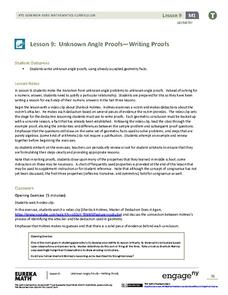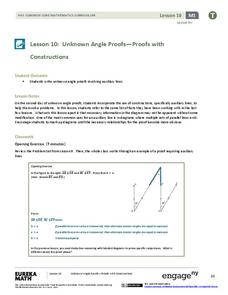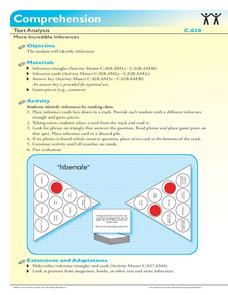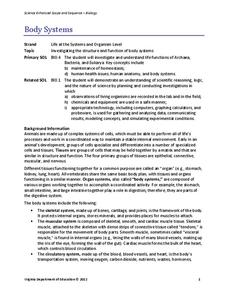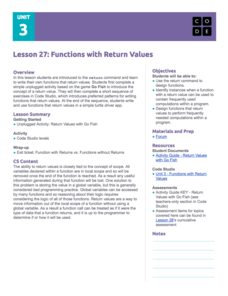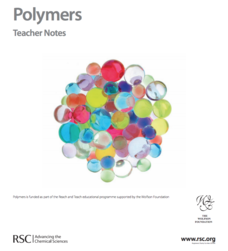EngageNY
Unknown Angle Proofs—Writing Proofs
What do Sherlock Holmes and geometry have in common? Why, it is a matter of deductive reasoning as the class learns how to justify each step of a problem. Pupils then present a known fact to ensure that their decision is correct.
EngageNY
Unknown Angle Proofs—Proofs with Constructions
Provide your emerging mathematicians with the tools to learn as they incorporate auxiliary lines to solve unknown angle proofs in this continuing segment. They decipher information from a diagram to uncover the missing pieces and...
Florida Center for Reading Research
Comprehension: Text Analysis, More Incredible Inferences
Reinforce inference skills with a learning game! Scholars read scenarios on cards and match them to a written inference on the triangle. The first pupil to match all their inferences wins!
Virginia Department of Education
Planet Line-Ups
Should Pluto be considered a planet or a dwarf planet? Scholars research planets in our solar system to understand their similarities and differences. It also includes memory activities related to the order of the planets.
Bowels Physics
Graphical Analysis
Assist your class in learning graphical analysis by reviewing the slide presentation. Class members review 15 slides to further understand concepts such as velocity and acceleration. They conclude with practice problems related to the...
Virginia Department of Education
Body Systems
The human body is an amazing thing! Explore the body with your high school class as they investigate each system in detail. They learn components of each organ system and disease processes that can negatively affect general health and...
EngageNY
Construct a Perpendicular Bisector
How hard can it be to split something in half? Learners investigate how previously learned concepts from angle bisectors can be used to develop ways to construct perpendicular bisectors. The resource also covers constructing a...
WindWise Education
How Does a Generator Work?
I get a charge out of this. In order to learn how a generator works, groups build and test one in this ninth lesson of the series. The generators are tested at low speed and high speed to determine the watt output and whether they have...
Star Date
Shadow Play
Three activities make up a solar system lesson that features the sun, its light, and the shadows it produces. Scholars step outside to discover the changes shadows make at different times of day, take part in a demonstration of how Earth...
EngageNY
Law of Cosines
Build upon the Pythagorean Theorem with the Law of Cosines. The 10th part of a 16-part series introduces the Law of Cosines. Class members use the the geometric representation of the Pythagorean Theorem to develop a proof of the Law of...
Code.org
Functions with Return Values
Young computer scientists explore how to use the return command in computer programing by playing Go Fish. They learn about functions that return values and then write a turtle driver app using the return function.
Code.org
Digital Assistant Project
Scholars apply previously learned skills to create a functional computer program. They produce a digital assistant incorporating string commands and complex conditional logic.
BBC
The Monarch's Changing Role
Though the grandeur and elegance of the British palace remains unchanged throughout history, the role of the monarch has shifted from absolute rule to collaboration with a constitutional parliament. Young historians learn about the...
National Institute of Open Schooling
Compounds of Carbon Containing Halogens (Haloalkanes and Haloarenes)
Halogens comes from a Greek word which translates to make salt. Lesson 27 in the series of 36 teaches pupils about halogens. Pupils read, discuss, and answer questions in order to learn about haloalkanes and haloarenes. From defining...
National Institute of Open Schooling
Colloids
Classes explore colloids through readings and questions in lesson 10 in a series of 36. They learn everything from methods of preparation and properties to how to classify colloids. They finish the lesson by seeing how to apply...
Teach Engineering
Alloy the Way to Mars
Future engineers test different alloys to determine the specific strength of each one. Based on the results, they make a recommendation to NASA on which alloy to use on engines for spacecraft.
PBL Pathways
Arsenic and Selenium Removal From Drinking Water at a Minimal Cost
Decide on the most efficient plan to supply drinking water. The second project-based learning task in a two-part series builds upon the first project. Pupils revisit the wells to supply drinking water, but they must make sure the...
EngageNY
Dividing Fractions and Mixed Numbers
Class members discover how to extend division to fractions to mixed numbers. Individuals first review how to convert mixed numbers to improper fractions and then apply division strategies learned in previous lessons. A memory game tests...
Cornell Lab of Ornithology
Life In A Nest: Exploring Life Cycles With Bird Cams
Why read about it when you can watch it happen? Bird cams make it possible for learners to experience the life cycle of a bird in real time! An engaging set of lessons provides activities to connect their learning to bird cam...
Florida International University
Design Your Own
Apply scientific principles to designing an experiment to study organisms living on the coral reef in our oceans. Through reading, individuals learn about the coral reef ecosystem and important factors that affect its function. Using the...
Nemours KidsHealth
Drugs: Grades 9-12
What do drugs do to the body and to the mind? What are the dangers of using drugs? How can teens respond to the pressure to use drugs? After reading a series of articles related to drug use and abuse, class members prepare a skit to...
Royal Society of Chemistry
Polymers—Gifted and Talented Chemistry
Polymers are an important part of our day-to-day lives, but how much do your pupils know about them? Learn the basics and beyond in a series of activities designed to build skills in observation, planning, organic chemistry, and bonding.
Teach Engineering
Edible Algae Models
Sometimes it's okay to eat your science experiment. A hands-on activity has pupils create models for algae to learn about its cellular structure. The best part of the experiment? The resulting juice-filled gels are edible—yum!
Nuffield Foundation
Monitoring the Body's Reaction to Stress
When stressed, do you prefer the fight or flight response? Scholars observe, measure, and identify the body's response to stress using a well-researched methodology. They learn about the autonomic nervous system, hormones, and more.


